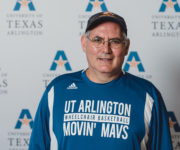Meet the Match
South African Paralympic Champions Brings Basketball to Kids
In Zulu culture, challenges are seen as something to be conquered. Younger generations are driven to persevere in the face of obstacles—a spirit instilled in them by their forefathers.
For Siphamandla Gumbi, or “Sips,” these values were embedded in him as a boy in Umlazi, the second largest township in South Africa. At the age of 5, he became a wheelchair user after suffering paralysis from the removal of a tumor on his spine.
Sips missed three years of schooling and was sent to a boarding school almost 200 miles from his family to catch up. Upon his return to mainstream high school, new accessibility issues faced him.
“In order to get to class, I had to take my crutches so that I could climb up the stairs,” Sips says. “It taught me to persevere, be calm, and to always look forward and hope for better.”
Sips continued his studies in sport science at the University of Durban-Westville, where a friend first introduced him to wheelchair basketball. He had already inherited a love of sport from his father, a former player on one of South Africa’s top soccer clubs, AmaZulu F.C.
Through wheelchair basketball, Sips found an empowering form of self-expression. His club, Visa Wings, dominated the local league, and he was eventually called up to South Africa’s national team. In 2007, the team won the All-Africa Games in Algeria, then moved on to defeat Morocco in Paralympic qualifiers, becoming the top team on the African continent and qualifying for the 2008 Beijing Paralympics. Winning the competition remains his greatest basketball memory.
“We conquered Africa and earned the chance to show our skills to the world,” Sips says. “That drives you to develop the sport because those memories stay in your heart forever. It gives you a hunger to win and conquer.”
With 150 national team appearances and a 2008 Sportsman of the Year for the Disabled award to his name, Sips still plays and coaches competitively. He balances his sporting career with a job as a mobility consultant manager covering two provinces for Chairman Industries—a manufacturing and supply company for wheelchairs.
“I wake up at 4 a.m. to exercise and eat breakfast, then I travel around to do my consultations, home visits, repairs and deliveries,” Sips says. “At night, I head off for training. I don’t know where I get the energy. But I know people need me. Do I give up because it’s a sacrifice? Never.”
Currently, Sips is determined to develop youth wheelchair basketball throughout the country. Aside from inaccessibility and poor living conditions for people with disabilities, he acknowledges challenges posed by high crime rates, drug abuse, and youth pregnancy. Sips believes sport can help young people overcome these challenges and serve as a launching pad to a better life.
Sips leads youth basketball programs for Marlins Basketball Club—one of South Africa’s most successful wheelchair basketball organizations. In 2015, he coached a group of girls who represented South Africa in Paralympic qualifiers. Seven members on his boys team also successfully qualified with the national side for the U-23 World Championship in Canada. Aside from the competitive track, however, Sips wants to create a recreational program that reaches more youth in the province of KwaZulu-Natal. As part of this commitment, he developed a partnership with a non-disabled basketball team. This inclusive project unites players with and without disabilities on the court to create mutual understanding.
“It is not my legs that tell me where to go—it is my head and my heart,” Sips says. “I invite people who doubt to come play with me in the chair. They’re surprised when I can hang with them. Anyone can end up in a wheelchair and it doesn’t mean you should give up your love of basketball.”
With mentor Doug Garner, a career disability rights advocate who was honored as a 2015 Champion of Change by the White House, Sips had access to a community leader with more than three decades of experience in the intersection between sport and education. Under Doug’s leadership, the University of Texas-Arlington has organized teams in five different adapted sports, engaging three dozen student-athletes and more than 500 members of the campus community, while creating one of collegiate sports’ most successful wheelchair basketball programs. Doug closely guided Sips as he worked to create a comprehensive and sustainable youth wheelchair basketball structure and to implement projects that engage the breadth of South Africa’s disability community.

